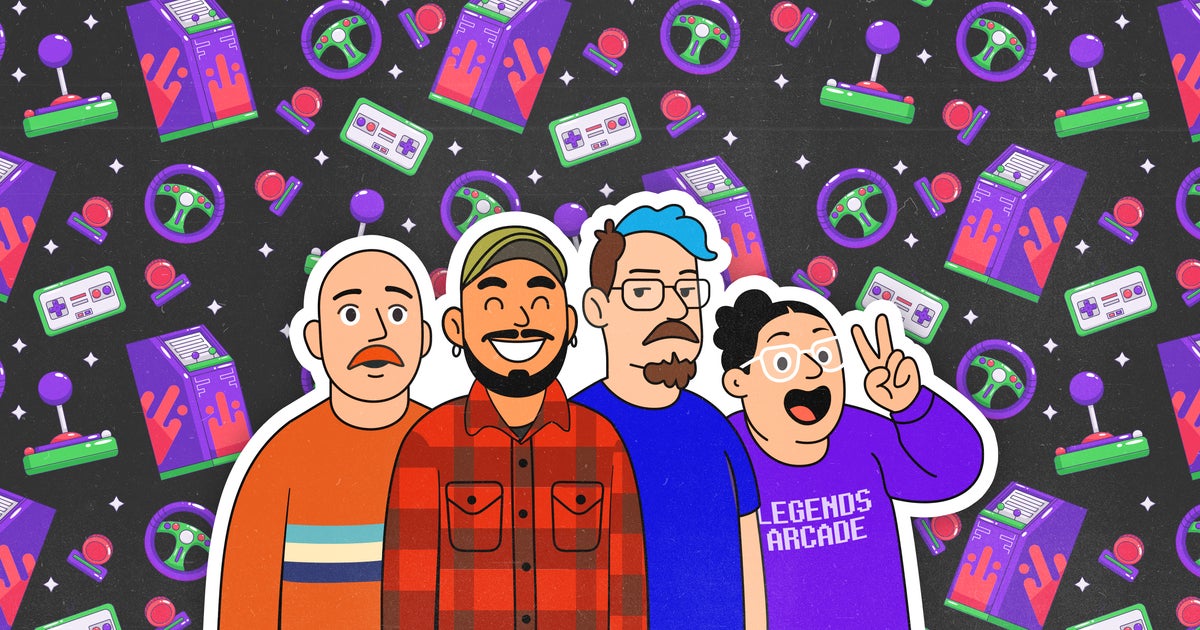Change can begin anywhere. It only requires that we desire it and that we’re prepared to take a chance on it when we see it for what it is.
Hades Lestary had been a chef for most of his life, honing his routine like a rock smooths in the ocean. Wake up early, work hard, sleep late – every day a tumble and turn in the sea. And he was used to hard work: he’d been a US Marine before, though he’d left active service 10 years ago, taking PTSD with him as a kind of ironic souvenir. His life was predictable. Comfortable, perhaps. But inside he was unfulfilled, and deeper down, a more unsettled part yearned for something else.
Lestary came home one day to find his roommate on their sofa playing a game. He didn’t, however, recognise what was being played. So he asked: “What are you playing, dude?” To which his friend simply replied: “I’m farming.”
Perhaps taken aback by the bluntness of the answer, or perhaps bleary-eyed from work, Lestary momentarily struggled to comprehend what he was being told. So he asked again: “You’re what?” To which his friend again replied: “Farming.” And when Lestary said nothing in response, finally a little explanation came. “It’s a simulator.”
A simulator. Lestary’s friend was into simulators and played them all the time, though Lestary didn’t see the appeal. But there was something about this situation in this particular moment that felt different, so Lestary, interest piqued, bit. “Well can I look?” he asked – and his friend agreed. And Lestary never looked back again.
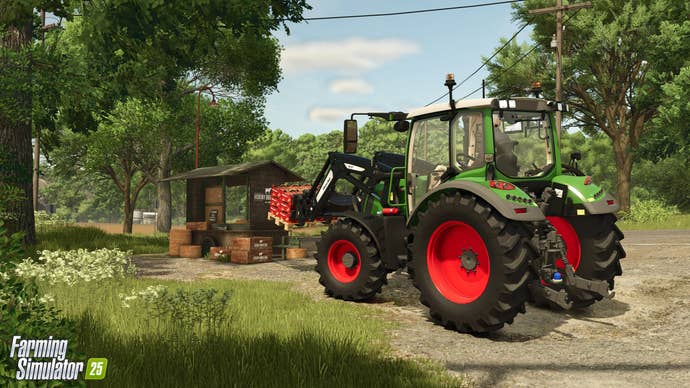
Think of a job and there’s probably a simulator for it – they have multiplied like frogspawn in recent years. Flight simulators and football managers and racing sims we’re used to, because they’ve been around for years, but trucking sims and farming sims and power-washing sims are newer. There are even publishers who specialise in quickly made sims covering any career path you can think of – house renovation, being a car mechanic, a thief (I don’t remember that one from school careers day). Where there’s clearly interest, there’s clearly money to be made. There’s even Farming Simulator esports.
But the simulators we know are often only a door to something deeper beyond. A passion for Microsoft’s Flight Sim series might lead you to the even more complex X-Plane simulator, for example, just as a passion for racing sims like Gran Turismo might end in an obsession with iRacing, as former Eurogamer editor Martin Robinson will attest. The world of simulators is bottomless: they go as far as you’re prepared to.
“Sometimes you just want a bit of comfort food. You don’t want a big, chewy story and triple-A production”
Simulators have inspired real-life fairy tales before, too. The glitziest you’ll have heard of: Sony’s recent Gran Turismo film, which recreated the story of Jann Mardenborough, a British teenager who beat tens of thousands of gamers to become a real-life race driver. The rise of football manager Will Still is also well documented, his love of the Football Manager game having helped him onto a very successful real-life career. He currently manages top-flight French team Lens. But these are the biggest stories; for every one that has movie potential there are countless others, each altering lives in no less fundamental ways.
Craig Wilmott stood at the crossroads of change after 20 years working in supermarket chain Morrisons. He had different ambitions when he was younger but family illnesses hardened a teenage trolley job into a career. Yet even two decades of service doesn’t protect you from restructuring, it seems, and so five years ago, with the world in the grip of Covid, he found himself shuffled into nightshifts, feeling more isolated than ever. What could he do?
The thing about night shifts is you need to keep your sleep-wake pattern going on your days off or you’ll confuse your body, so Wilmott needed a way to stay awake, even when the world around him was asleep, which is not an easy thing to do. He found the answer in games. Specifically, he found the answer on Twitch and in a game people were playing there which looked like exactly the thing he needed. A relaxing game. One that could occupy his brain without overloading it. “Sometimes you just want a bit of comfort food,” he says, talking to me in a video call now. “You don’t want a big, chewy story and triple-A production. You just want a stupid, mindless task.”
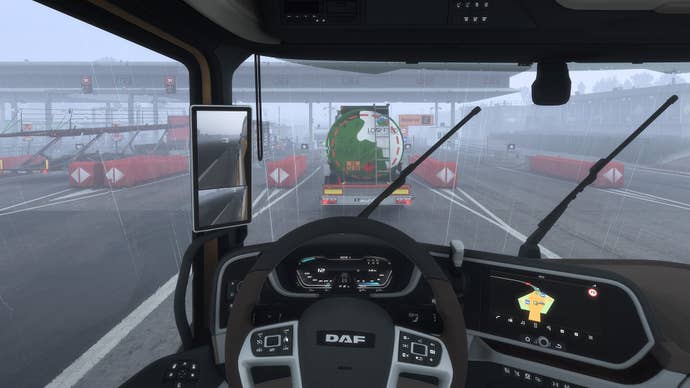
He’s Scottish, Wilmott, 42 years old and mildly mannered. He’s got light skin and a shaved head – a recent development – and seems familiar with the world of games. Euro Truck Simulator 2 was by no means his first gaming experience. But the more hours he put into it, the more drawn he found himself to it, to that feeling of freedom that driving has always given him, and he began to wonder. “I’m sitting here spending three or four hours playing this, I’ve played it for X number of months, I’m enjoying it. Would it be possible to get out and actually see what it’s like in real life?”
Luck smiles on a change, I like to think, and so it did for him, as an aunt who worked in logistics arranged a ride-along day in a lorry for him. And even though aspects of it were undeniably different in reality – the heft of the vehicle for one – there was a feeling underneath he recognised. “The thing with Euro Truck Simulator is the vibe,” he says, “the feeling of being by yourself, just you and the road, which is definitely very much what it’s like when you’re out.”
That day, then, he chose a road – Craig Wilmott decided to become a trucker.
“All this time I’ve been looking for something that I want to do, that I love, but that I also feel at peace with when I do it”
The appeal of Farming Simulator instantly grabbed Hades Lestary as his roommate demonstrated it that fateful day. “I just started playing it, playing it, playing it,” Hades says with a wide grin across his face – a grin that’s always there, I’ve come to realise. “Whenever I played the game, it was like a sense-state,” he adds. “My mind is blank, I’m just playing the game, my worries are gone.”
Lestary is half Puerto Rican and half Colombian, with warm tanned skin. He’s laidback, friendly, and radiates good energy. He’s 36 years old. And as with Wilmott, Lestary began to feel a secondary thought surfacing the more he played Farming Simulator. “All this time I’ve been looking for something that I want to do, that I love, but that I also feel at peace with when I do it,” he says. The thought: what if farming was it?
Thought planted, Lestary’s gaming sessions took on a slightly different edge, as he used the game to explore the possibilities of doing this for real. He realised early on that the large-scale farming fantasy the game presented, of hundred-thousand-dollar tractors trundling over hundred-acre farms, was out of reach. But if he modded the game to focus on something smaller – a farm with a few small crops and a greenhouse, say – then the vision became much more manageable. He doubled down and ran his plan through the simulation over and over again, seeing if he could make the numbers to make it work, and he could. The next question was, could it work in real life?
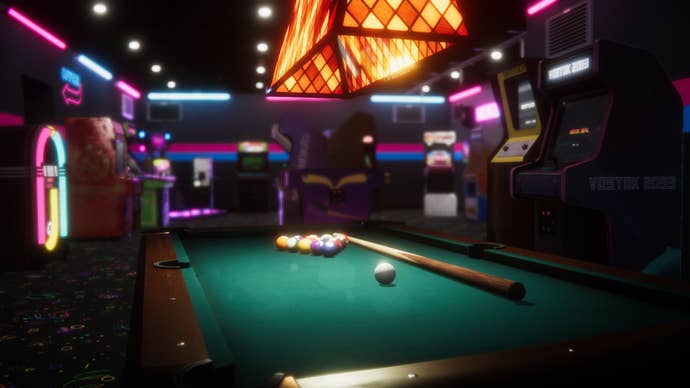
But the spark of change is a vulnerable thing, and without the right nourishment and the right surrounding conditions, it mightn’t catch. Ashley Mcgehee and Will Brown had a dream they were inches from realising: they planned to fill a hole in their small Oregon community by building an arcade. They had a business plan, they punched the numbers, they scouted a location so coastal it was almost in the Pacific Ocean, and they lined up everything for a March 2020 opening date. Then Covid came. And as Lockdown paralysed society for months and then years, their dream wobbled like a bubble on the wind, threatening to blow away.
For Mcgehee and Brown, Arcade Paradise arrived like manna from heaven. There they were, struggling to hold onto their dream of opening an arcade, when a game about exactly that fell into their lap. They were stunned. “We picked it up on a whim and we were like, ‘Wow this game was built for us,'” Mcgehee tells me, laughing. She has a loud and catching laugh, and does the majority of the talking. She’s 38 years old. Brown, by contrast, is more reserved, though he is recovering from an illness when we speak. He’s 40 years old. Mcgehee’s background is in psychology and working with people with severe mental illnesses, whereas Brown’s is in 3D modelling and design, and large art installations. There’s even a chance you might have seen his portrait on a London tunnel wall.
“Sometimes I watch a kid pick his nose and wipe it on a $5000 game and then lick it off and I get really confused about the path of humanity”
For them, Arcade Paradise was a lighthouse in the dark, guiding the way towards something they were in danger of losing. It re-focused them, re-energised them. “It lit a fire under our ass to actually do it,” says Brown. “So by the time the opportunity came back around for us to actually do it,” Mcgehee adds, “we were like, ‘We actually have to do it now. We can’t chicken out this time.'”
They were as good as their word: the opportunity did come around again and on 2nd February 2024, they took it, opening Legends Arcade. When we talk, they’ve just passed their arcade’s first birthday, which is an important milestone in any start-up business, I’m told. Most businesses don’t get that far. And not only has it survived but it’s done well enough that they’re looking ahead to expansion in the coming years. “I’ll be honest,” Mcgehee says. “I never actually expected us to get here.” With that she laughs again. “That sounds really terrible. I probably shouldn’t say that out loud.”
Their arcade is relatively modest, measuring about the size of two convenience stores shoved together, or 3000 square feet if you can visualise that. But crammed into that space are 65 delicious, bleeping, arcade machines. There are all sorts. There’s a reproduction Dragon’s Lair cabinet which Mcgehee loves and is determined to beat, and there’s even a fabled Polybius. This is Oregon, the state where the Polybius urban legend began, so Brown believed it only right he should build a cabinet of his own. It turns heads with the right people. “Is this real?!” they blurt. “And we’re like, ‘You can play it – it’s right there,'” he says, smiling. “I’m very proud of it.”
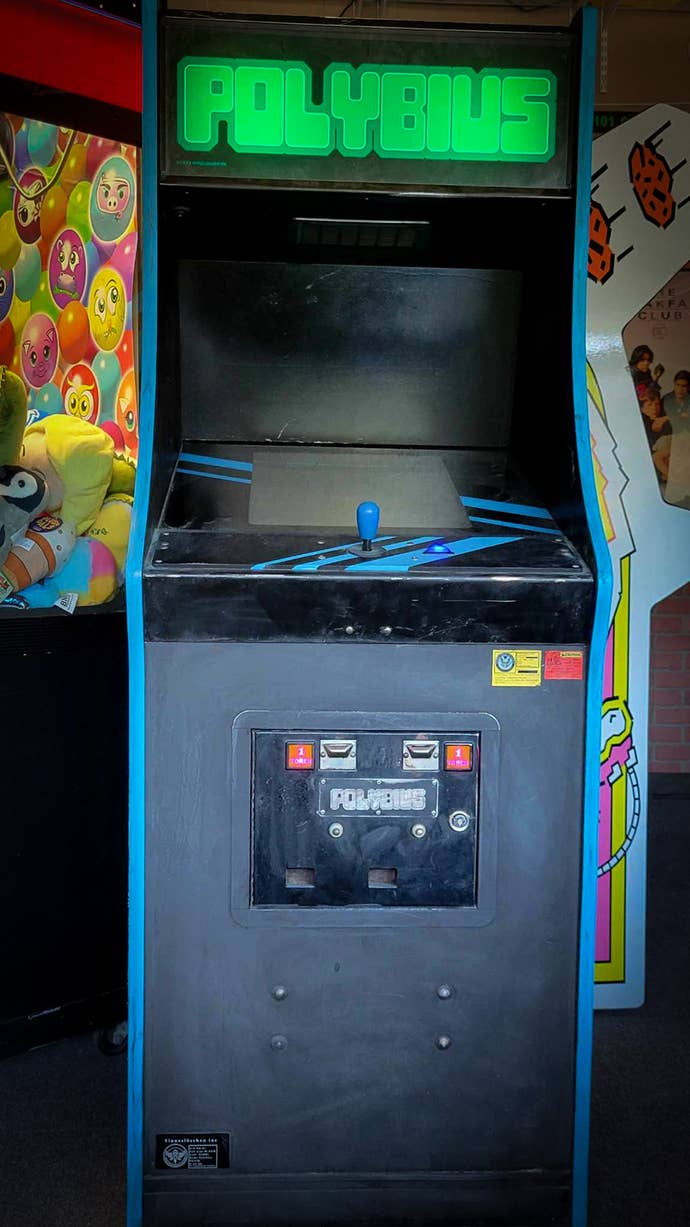
“There are times where I look out over what we’ve built and I’m so proud,” Mcgehee adds. And Arcade Paradise helped them get there. But there are some realities about owning an arcade that the game could not prepare them for.
Reality number one: arcade cabinets are heavy and don’t magically appear on the back of a lorry and then in the place where you want people to play them. You have to move them. You have to, if you’re buying them second-hand as they do, rent a truck and drive hundreds of miles to pick them up (they should call Craig Wilmott). “It’s backbreaking work,” Brown says. “You don’t realise how heavy some of these games are to move.” The cabinets you’re probably thinking of are okay – the stereotypical single width, roughly person-sized machines, but there are others that are beastly. “We have one game that weighs 1800 pounds,” Brown says. “It lives in the same spot it was put.”
Reality number two: your home is now taken over by unused machines. “Right now in our kitchen, between our sink and our stove, is a Golden Tee arcade cabinet that we’re repairing,” Mcgehee says, “so to make dinner, you have to move around it.” In their garage, meanwhile, they have a Dinoscore, a Treasure Falls, three Mr Vacuums – “don’t judge me” – an old basketball game, and an automatic cotton candy machine, which is apparently very heavy, and all in varying states of repair. Repairs they have to carry out themselves.
Reality number three: not everyone cares for your machines like you do. “Sometimes I watch a kid pick his nose and wipe it on a $5000 game and then lick it off and I get really confused about the path of humanity,” Mcgehee says, laughing. “I don’t get sick of them,” Brown adds, “I get sick of how people treat them. You become attached to them, they’re like your children. You’re like, ‘Don’t hurt my babies! Don’t slap it!'”
However, there are some things Arcade Paradise did prepare them for, such as unclogging the toilet, for one. “Every time I have to unclog the toilet at work, that’s all I can think about,” Mcgehee says, “the mini-game about unclogging the toilet in Arcade Paradise.” More importantly and more helpfully, Arcade Paradise also reinforced for them the importance of keeping paperwork in order, and the need to make a business case for each machine they wanted to buy. How many plays will a $3000 machine need in order to pay itself off, for example? “It does actually really help prepare you for some things you don’t think about,” Mcgehee says.
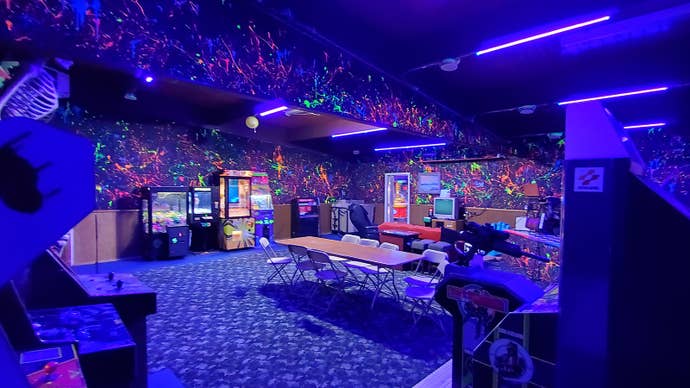
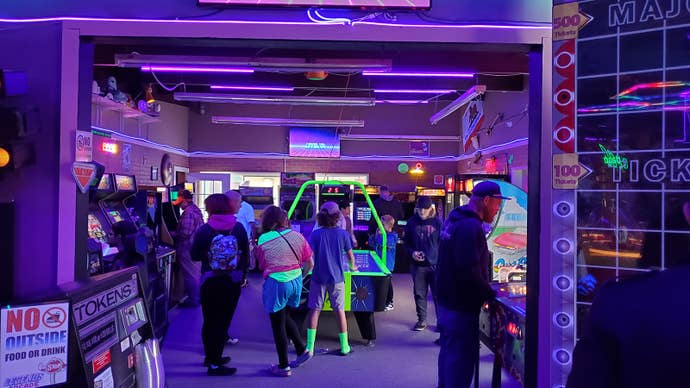
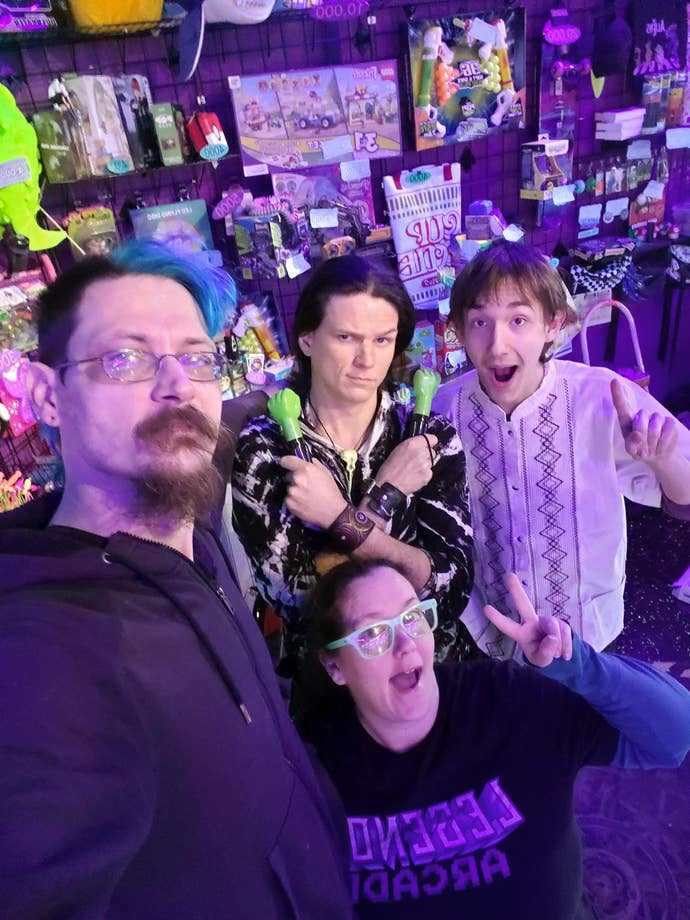
Craig Wilmott credits Euro Truck Simulator with helping him pass his lorry driving test – his heavy goods vehicle test. He had one practical driving lesson a week for 12 weeks, so there was a lot of time in between to forget things. Truck Simulator helped him stay sharp, especially where reversing manoeuvres were concerned, which are, in an articulated lorry (a lorry with an attached trailer), the exact opposite of a car and “the hardest thing”, he says.
He’d practice in the game for hours, always opting to finish a mission in the most difficult way and deliver the goods precisely where a customer wanted them. He’d even mod-in recreated versions of the test centre where he would do his manoeuvring test, so he could drill it. “I’m one of these people who’ll quite often start things and not finish them. My whole life I’ve done that,” he says. “But the fact I put all these hours in, virtually if you will: it gives you that extra confidence to say, ‘You know what, I could do this.'” And he did: Wilmott received his licence in 2022.
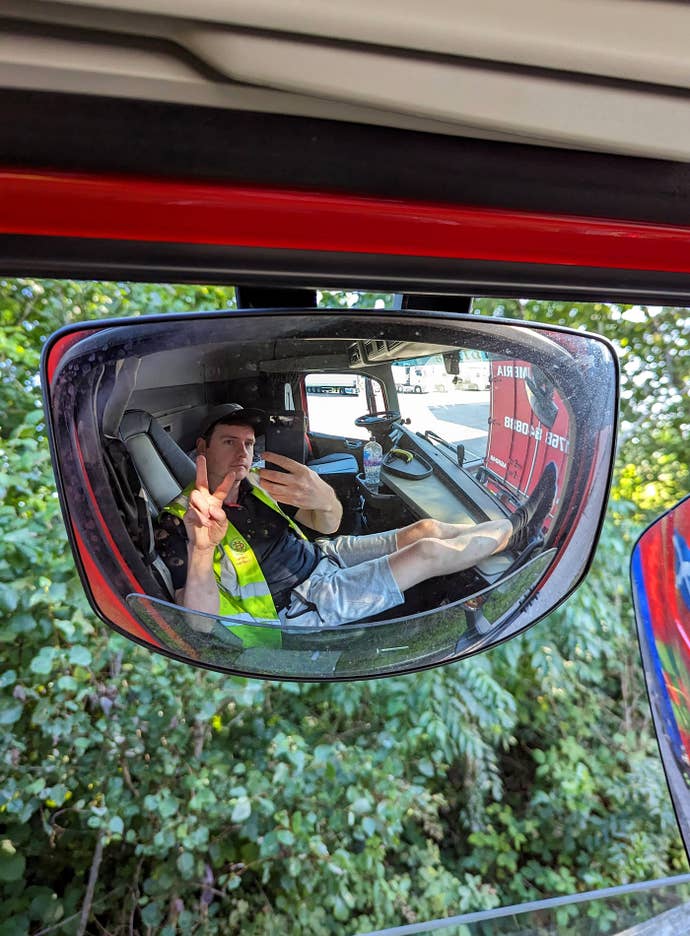
But as with running a real arcade, there are realities about being a real truck driver that a game can’t prepare you for. Overwhelmingly, the biggest is the responsibility of driving a vehicle that large on the road. “You feel more responsibility, like a weight on your shoulders,” he says. “They’ve trusted me with a massive, 54-foot-long vehicle,” which I believe is as large as they’re allowed to be in the UK. And not only is it the length you need to be aware of but the height, when approaching low bridges, a detail the game overlooks. “If you damage it in a game: no consequences,” he says. Whereas if you damage it in reality… Wilmott doesn’t elaborate but I don’t think he needs to.
Beyond the sheer size of the truck, there are also the more mundane realities of working a job like this. There’s keeping your lorry maintained so the police don’t pull you over; there’s lashing loads to the back of the lorry in the pissing rain, as Craig colourfully puts it; and there’s finding places to sleep. You can’t, by law, drive for more than 10 hours in a day, and you need nine hours off before you can drive again – hours often spent by the side of a road in your cab.
“What the simulator doesn’t cover is it’s 20-past seven at night, all the truck-stops are full, all the laybys are full – where are you going to stop? What they also don’t cover is you’re sitting in a layby and there’s traffic going past you at 60 miles per hour and the whole thing is shaking, then you need to get a night’s sleep. That’s the part of the job a lot of the guys struggle with,” he says, “because it’s quite isolating. You don’t get that from the simulator: you turn the computer off and go.”
Craig, for what it’s worth, takes his Switch.

Hades Lestary and his partner opened their farm, Common Ground Cultivation, in autumn 2023, in Maryland in the United States, and last year they had their first successful year, producing enough food to feed 15 families across the entire 28-week growing season. They’re a small business, like Legends Arcade, operating on a quarter-acre of land (about the size of a house plot), “But because of the way we grow food, we’re able to grow a lot of food very densely in a small area,” Lestary says.
Specifically, they focus on Community Supported Agriculture, or Market Gardening as it’s sometimes called, which is small-scale, intense, and in their case relatively sustainable farming, designed to deliver food directly to customers. People pay relatively low amounts for veg boxes that tend to overdeliver, basically. “We’re trying to provide low income people with a chance to get good products for affordable prices,” Lestary says. And he loves it. It’s hard work, obviously – they don’t have the money or the land for tractors so it’s done by hand – but the effect farming has on him in real life is exactly what appealed so strongly in the game. “It’s like there’s silence,” he tells me. “There’s just this peace that you cannot find anywhere else. From the game to real life, it’s the same feeling.”
“There’s just this peace that you cannot find anywhere else. From the game to real life, it’s the same feeling”
What I find even more intriguing is that Lestary still plays the game, whereas trucker Wilmott, by comparison, does not – understandable given the hours he spends trucking for real. “I still play!” says Lestary, beaming. And not only does he still play (and not only do other younger farmers he meets play the game too), but he uses Farming Simulator as a side-by-side tool to help his real-life business. The game does a great job of simulating crop growing times, he tells me, so he uses it to plan his growing season out. “Like a schedule kind of deal,” he says. This requires mods, which is why he’s still playing Farming Simulator 23, because his rule of thumb is to wait two years for the modding community to catch up.
There are many things the game doesn’t do, though, even with mods. Irrigation is glossed over but is a constant worry in real life – which type you use, whether the tubing will freeze, whether it’s over-watering or under-watering. Then there’s fertilisation: in the game you just buy one kind and dump it on the ground and the job’s done, whereas in reality, there’s a whole science to it, which Hades, who mixes his own, has devoted many hours to. Plus there are the endless repairs and maintenance he has to perform, similar to Legends Arcade. In reality, the list of chores is long. Simulate everything, though, and you’d struggle to make a game fun to play – all three sets of people recognise this. Simulators show the good parts, not the bad. That’s what initially appealed to each of them, after all. And if it hadn’t, where would they be now?
“If it weren’t for Farming Simulator, I would have never become a farmer,” Lestary tells me, in all earnestness.
“If I hadn’t invested the time in Euro Truck, I don’t think I would have had the self confidence to start my journey,” Wilmott adds.
“During that time when we were stuck and we were like, ‘This is what we want to do but we don’t know how to get there,’ that’s when we started playing and were able to realise that dream through a video game,” Mcgehee says. “It really did provide some solace in a really hard point.”
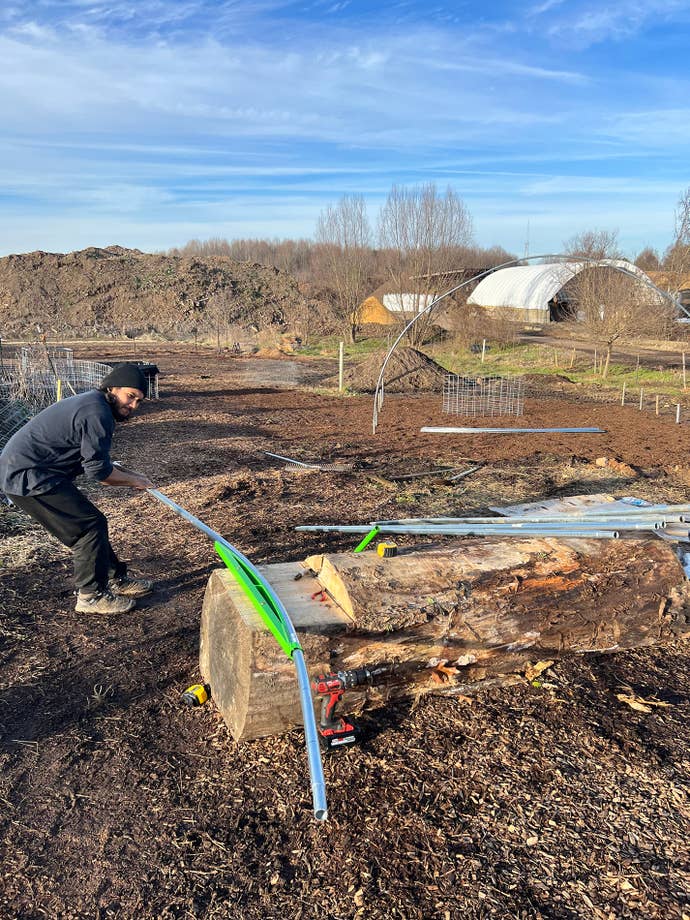
Three sets of people whose lives were irrevocably changed by video games, in a good way. It makes me wonder how much the games’ respective makers know about stories like these, that their creations inspire. The Legends Arcade duo did actually make contact with the maker of Arcade Paradise, Nosebleed Interactive, and the game’s creative director Ardreas Firnigl specifically. They emailed him accidentally because Brown wanted to know why the game was preventing him getting past a high score he’d set on the Vostok 2093 machine. To which Brown says Firnigl unexpectedly replied, “You’re not supposed to get that far!”
They struck up a correspondence and told Firnigl how much his game meant to them, and that they intended to honour it by recreating the employee of the month plaque from the game for their arcade wall. “Little did we know that the picture for the employee of the month was Andreas’ passport picture from when he was 13,” Mcgehee says, laughing. “And he actually took a picture of it – he went and found the original and scanned it in for us so we could have this real-life easter egg.” They made themselves a plaque and shipped one to Firnigl, too.
“The idea that our game somehow influenced a real arcade, which is obviously the thing that influenced the whole game, was really special”
“Of course I obliged,” Firnigl tells me over email. “As a developer, one of the nicest things that can happen after a game is released is having fans get in touch to tell you how much they enjoyed the game. What’s even nicer is hearing fans’ stories of how playing a game that’s come from your imagination has somehow got them through a tough time. The idea that our game somehow influenced a real arcade, which is obviously the thing that influenced the whole game, was really special. Like some weird symbiosis!”
Giants, the creator of Farming Simulator, says it hears stories like Lestary’s allof the time. “We have heard countless stories from players who started with the game, got inspired, and eventually became real farmers,” marketing manager Martin Rabl says. “It’s amazing how virtual farming can spark a genuine passion for agriculture and ultimately shape careers. Our ongoing conversations with agricultural producers also confirm that the Farming Simulator series was one of the first points of contact with farming for many new employees.” It’s an increasingly important way of reaching a new generation of farmers in a world where their numbers are dwindling.
SCS Software, the creator of Euro Truck Simulator 2, I don’t hear back from.
And so I leave these people inspired by video game simulators to their new-look lives. I leave Hades Lestary as he begins planting crops for the growing season ahead, having planned it in Farming Simulator first. I leave Ash Mcgehee and Will Brown as they prepare for a busy weekend of birthday parties, first dates and families reconnecting through play – and for the arrival of their first brand new machine, a huge pearl pusher (think two-pence machine) called Over the Edge. And I leave Craig Wilmott preparing for another four days on, loading up on podcasts and Switch games, and once again looking forward to the freedom of the open road.
